#biden adminstration
Text
The Biden adminstration prioritizing getting out safely American citizens in Israel vs unable to do the same for American citizens in Gaza getting bombed by their good friend Israel is a great example of how differently both groups are treated even as American citizens.
"We've been in touch with the State Department since day 1 of the war…nothing has happened," Okal said, saying rounds of airstrikes made it impossible for the family to sleep at night. His son has become more attached to his parents — unable to be without one of them at all times — and has taken to waking up screaming in the middle of the night from what his parents suspect are nightmares, Okal added.
In an interview with HuffPost on Monday, Nabulsi blasted the Biden administration.
"I just can't understand how the right hand does not know what the left hand is doing at any given time," he said. "Both the secretary [of state] and the president are clearly prioritizing military aid to a foreign government, the destruction of a foreign territory and frankly the killing of foreign civilians over the safety of American citizens."Nabulsi drew a contrast with the support provided to Americans who were in Israel after the Palestinian militant group Hamas launched a brutal shock attack in the country on Oct. 7. The U.S. government arranged more than 5,000 seats on specially chartered planes and ships to evacuate American citizens from Israel and the occupied West Bank.
"As an American citizen, it should not matter which side of the wall they're on," Nabulsi said.
U.S. officials asked a private citizen to use his own contacts to help a stranded family and hinted at dangerous internal misunderstandings, messages show.
10 notes
·
View notes
Text
The filibuster has been much in the news lately, either as the barrier to Democrats over-riding the Supreme Court’s decision in Dobbs v. Jackson Women’s Health Organization, which overturned Roe v. Wade, or as a barrier to other putative agenda items where Democrats could (notionally) get a simple majority, but not the supermajority of 60 needed to end a filibuster: packing the court, a Green New Deal, etc. Here President Biden gives nominal support to ending the filibuster:

Unsurprisingly, however, Biden declared himself impotent two days later:
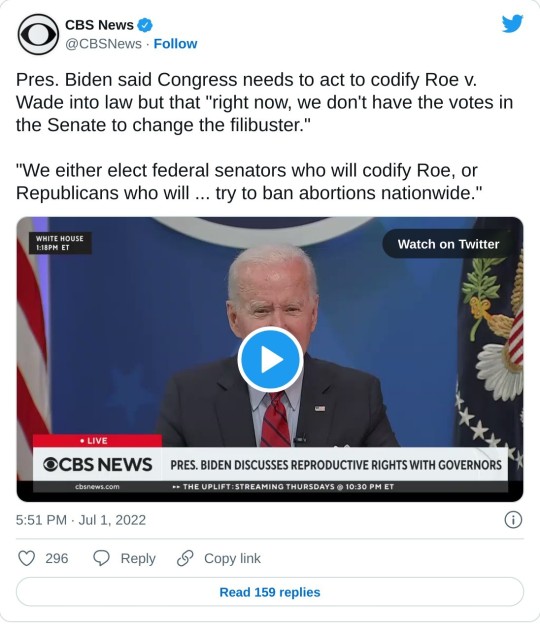
Biden may be, of course, genuinely impotent just now: Senator Leahy is out of commission with a broken hip. Then too as always President Manchin and Kristen Simena would need to be brought on board. One sighs for the days when Presidents knew how to muscle the Senate:

We should, of course, not forget that the Democrat Party did not become what it is through a random process. As I wrote:
The Democrat Party was constructed. It is the way that it is because that’s how its leadership wants it. It’s more auto-kinbaku-bi; the Democrat jouissance from tying themselves up, and rendering themselves helpless (filibuster; Parliamentarian; moderates). It’s not merely pragmatic; I swear they actually get a thrill, a guilty pleasure, out of it.
When you read the section on the Senate rules, you will see a fine example of auto-kinbaku-bi, albeit a bipartisan one. With that I will leave the politics of the day behind.
Back in 2012, I wrote a post on the filibuster: “The Obama Enabler’s Big Lie: “We Never Had the Votes,” meaning the 60 votes needed to pass a cloture motion and end a filibuster. I showed there were two ways to get the votes by removing the 60 vote supermajority and replacing it with a simple majority: during a session, using tricky procedural maneuvering (“the nuclear option”), or at the start of a session, when the Senate bootstraps itself (“the Constitutional option”)
That conclusion still holds, but I wish to go the same ground in more detail. First, I will go through actual sources on Senate procedure, hoisted from a long comment inspired by a question from alert reader Fraibert, (These procedures are complicated — the Bourbons of Louis XVI’s day would would loved them — and I hope I’ve gotten them right. No doubt there is an expert on Senatorial arcana in the leadership who will correct me.) I will also point out where “the nuclear option” has been used, and could be again, were there the political will. Next, I will go through the reasons that some conservatives give for leaving the Senate, as a deliberative body, as it is. Finally, I will introduce the concept of “entrenchment,” an obscure tactic I’ve dubbed the “thermonuclear option,” which would assault the Senate’s very sense of itself as a “continuing body.” I’ll conclude with a brief remark on the politics of the current situation.
Senate Rules on the Filibuster
There’s a lot to unpack here. First, the Senate does indeed have standing rules:
The legislative process on the Senate floor is governed by a set of standing rules, a body of precedents created by rulings of presiding officers or by votes of the Senate, a variety of established and customary practices, and ad hoc arrangements the Senate makes to meet specific parliamentary and political circumstances. A knowledge of the Senate’s formal rules is not sufficient to understand Senate procedure, and Senate practices cannot be understood without knowing the rules to which the practices relate.
Back in 2012, I wrote a post on the filibuster: “The Obama Enabler’s Big Lie: “We Never Had the Votes,” meaning the 60 votes needed to pass a cloture motion and end a filibuster. I showed there were two ways to get the votes by removing the 60 vote supermajority and replacing it with a simple majority: during a session, using tricky procedural maneuvering (“the nuclear option”), or at the start of a session, when the Senate bootstraps itself (“the Constitutional option”)
That conclusion still holds, but I wish to go the same ground in more detail. First, I will go through actual sources on Senate procedure, hoisted from a long comment inspired by a question from alert reader Fraibert, (These procedures are complicated — the Bourbons of Louis XVI’s day would would loved them — and I hope I’ve gotten them right. No doubt there is an expert on Senatorial arcana in the leadership who will correct me.) I will also point out where “the nuclear option” has been used, and could be again, were there the political will. Next, I will go through the reasons that some conservatives give for leaving the Senate, as a deliberative body, as it is. Finally, I will introduce the concept of “entrenchment,” an obscure tactic I’ve dubbed the “thermonuclear option,” which would assault the Senate’s very sense of itself as a “continuing body.” I’ll conclude with a brief remark on the politics of the current situation.
Senate Rules on the Filibuster
There’s a lot to unpack here. First, the Senate does indeed have standing rules:
The legislative process on the Senate floor is governed by a set of standing rules, a body of precedents created by rulings of presiding officers or by votes of the Senate, a variety of established and customary practices, and ad hoc arrangements the Senate makes to meet specific parliamentary and political circumstances. A knowledge of the Senate’s formal rules is not sufficient to understand Senate procedure, and Senate practices cannot be understood without knowing the rules to which the practices relate.
So, arcane. Nevertheless, when a new Congress begins:
The Senate follows a well-established routine on the opening day of a new Congress. The proceedings include… adopting administrative resolutions, adopting standing orders for the new Congress….
In other words, the standing rules don’t simply carry over, as if they were defaults (see also Senator Byrd below at “dead hand”). They must be explicitly adopted at the start of a session. (I would speculate that’s one reason why the Manual of the Senate is often updated..)
There are, then, two occasions on which the filibuster might be altered or abolished. (In what follows, in quoting Senate rules, I will cite to the “Senate Manual” from the 116th Congress (2019 – 2020), found here).
(1) When a Senate session begins, by majority vote> (the “Constitutional Option”). From a history of the filibuster by the Congressional Research Service:
The Senate, exclaimed Senator Byrd, no longer had an effective Rule XXII [the filibuster rule]. He set about to revise Senate procedures on the opening day of the 96th Congress (1979-1980).
On January 15, Senator Byrd introduced a resolution, S. Res. 9, that proposed general reforms (e.g., the installation of an electronic voting system in the chamber), as well as others focused on post-cloture procedures. However, many Republican Senators believed that the changes proposed by Senator Byrd would reduce the role of the minority in the legislative process. To promote bipartisan collaboration and compromise, the two party leaders (Byrd and GOP leader Howard Baker of Tennessee) created an ad hoc committee to develop a mutually acceptable way to consider Byrd’s reform proposals. The key recommendation that emerged from the discussions was for the Senate to consider separately the post-cloture reforms embedded in S. Res. 9. On February 7, Senator Byrd submitted a resolution (S. Res. 61) that dealt only with post-cloture procedures.
Noteworthy is that on January 15, Majority Leader Byrd had made clear to his Senate colleagues that it was imperative for the Senate to deal with the postcloture filibuster because it thwarts “the will not only of a majority but of a three-fifths majority of the Senate, which, having voted for cloture signifies its will that the debate shall come to a close and that the pending matter shall be acted upon one way or the other.”315 If a unanimous consent agreement to address changes to the post-cloture filibuster was unattainable, Senator Byrd said that he would employ the constitutional option—”in essence upholding the power and right of a majority of the Senate to change the rules of the Senate at the beginning of a new Congress.” Moreover, he dismissed the view that the Senate’s rules continue from one Congress to the next unless they are changed in accordance with those rules. “That [Senate] rule was written in 1959 by the 86th Congress. The 96th Congress is not bound by the dead hand of the 86th Congress.” He went on to state:
The Senate of the 86th Congress could not pretend to believe that all succeeding Senates would be bound by the rules that it had written. It would be just as reasonable to say that one Congress can pass a law providing that all future laws have to be passed by a two-thirds vote. Any Member of this body knows that the next Congress would not heed that law and would proceed to change it and would vote repeal by a majority vote.
I am not going to argue the case any further today, except to say that it is my belief—which has been supported by rulings of Vice Presidents of both parties and by votes of the Senate—in essence upholding the power and right of a majority of the Senate to change the rules of the Senate at the beginning of a new Congress.
Note that this procedure was not carried out; Byrd’s threat was enough. I believe that Byrd’s mastery of arcana would make his views authoritative even today.
(2) When the Senate is in session, by creating a new precedent (the “Nuclear Option”). Fortunately we have a method translated into lay language, together with proof that this technique has been used successfully twice. From the Brookings Institution:
A more complicated, but more likely, way to ban the filibuster would be to create a new Senate precedent. The chamber’s precedents exist alongside its formal rules to provide additional insight into how and when its rules have been applied in particular ways. Importantly, this approach to curtailing the filibuster—colloquially known as the “nuclear option” and more formally as “reform by ruling”—can, in certain circumstances, be employed with support from only a simple majority of senators.
The nuclear option leverages the fact that a new precedent can be created by a senator raising a point of order, or claiming that a Senate rule is being violated. If the presiding officer (typically a member of the Senate) agrees, that ruling establishes a new precedent. If the presiding officer disagrees, another senator can appeal the ruling of the chair. If a majority of the Senate votes to reverse the decision of the chair, then the opposite of the chair’s ruling becomes the new precedent.
In both 2013 and 2017, the Senate used this approach to reduce the number of votes needed to end debate on nominations. The majority leader used two non-debatable motions to bring up the relevant nominations, and then raised a point of order that the vote on cloture is by majority vote. The presiding officer ruled against the point of order, but his ruling was overturned on appeal—which, again, required only a majority in support. In sum, by following the right steps in a particular parliamentary circumstance, a simple majority of senators can establish a new interpretation of a Senate rule.
We all may be under the impression — which neither Senators nor the press seem to think it is important to correct — that the fiibuster is immutable and unchanging. In fact, Senate rules for the filibuster have changed often, although the speed of change with respect to political time must seem geological. From Ballotpedia:
In 1964, during debate over what became the Civil Rights Act, southern Democrats filibustered for over 75 hours in an attempt to prevent the bill’s passage. In an effort to remedy the issue of future filibusters, Senate Majority Leader Mike Mansfield (D-Mont.) instituted two modifications. The first was to force cloture votes on filibuster threats; the second was to implement a two-track system. This system, instituted in 1972, provided senators the option to filibuster while the chamber considers other legislation. In 1975, the Senate again revised its rules to allow for cloture to be invoked by a vote of 60 senators, with the exception of Senate rules, which then required a two-thirds vote. Some argue that the two-track rule has lead to an increase in the use of silent filibusters. During a silent filibuster, a member does not need to speak on the floor to block a vote from happening and can even filibuster by email. A senator is not required to speak in public to prevent the passage of a bill. The senator simply needs to issue a warning that there are enough votes to support a filibuster.
(The two-track system has led to a proliferation of silent filibusters, because they are now essentially without cost). More recently:
Three of the most substantial legislative accomplishments of the past 12 years — President Joe Biden’s Covid-19 relief bill, former President Donald Trump’s tax cuts and former President Barack Obama’s Affordable Care Act — were only achieved by one party finding a way around the filibuster.
Senates during the Obama, Trump, and Biden years all used “the nuclear option.” I do not know what procedure Mansfield used. It might have been the “Constitional Option,” it might not have.
Justifications for the Filbuster
Heritage Foundation senior legal fellow Thomas Jipping justifies the filibuster as follows:
[T]hink of it in terms of a two-sided coin, one side of the coin is the filibuster, which is when senators try to end debate on a bill or a nomination but they fail. But the other side of the coin is a positive side and that is that the Senate was designed and viewed, I think, from the beginning to play a different role in the legislative process than the House. The House, it takes action and it’s just a simple majority of members can do whatever they want. Lots of things happen. Passions are flaring. But the Senate was designed to be more deliberative, to debate more. And so, a lot of times I like to refer to this as the Senate’s right to extended debate, which is part of the way the Senate does its legislative business, it always has.
( I don’t think branches of government have rights, but let that pass. Also, there’s nothing deliberative about a silent filibuster. It’s — follow me closely here — silent! And:
[I]t’s not supposed to be easy for government to do stuff [conservative cant on big gummint removed].
Indeed, James Madison writes in Federalist 62:
The mutability in the public councils arising from a rapid succession of new members, however qualified they may be, points out, in the strongest manner, the necessity of some stable institution in the government. Every new election in the States is found to change one half of the representatives. From this change of men must proceed a change of opinions; and from a change of opinions, a change of measures. But a continual change even of good measures is inconsistent with every rule of prudence and every prospect of success.
To trace the mischievous effects of a mutable government would fill a volume. I will hint a few only, each of which will be perceived to be a source of innumerable others.
In the first place, it forfeits the respect and confidence of other nations, and all the advantages connected with national character. An individual who is observed to be inconstant to his plans, or perhaps to carry on his affairs without any plan at all, is marked at once, by all prudent people, as a speedy victim to his own unsteadiness and folly.
The internal effects of a mutable policy are still more calamitous. It poisons the blessing of liberty itself. It will be of little avail to the people, that the laws are made by men of their own choice, if the laws be so voluminous that they cannot be read, or so incoherent that they cannot be understood; if they be repealed or revised before they are promulgated, or undergo such incessant changes that no man, who knows what the law is to-day, can guess what it will be to-morrow. Law is defined to be a rule of action; but how can that be a rule, which is little known, and less fixed?
Another effect of public instability is the unreasonable advantage it gives to the sagacious, the enterprising, and the moneyed few over the industrious and uniformed [?] mass of the people.
There is much to be said for what Madison urges. (One thinks, for example, of the confusion caused by the Comintern’s perpetual changes of the party line pre-World War II.) However, if we grant that Madison’s Constitutional architecture fulfills its ends, there’s no need for a filibuster on top of what’s already there.
The Theory of Entrenchment as a Tactic
We turn now to the “thermonuclear option.” Recall the concept of “standing rules”:
The legislative process on the Senate floor is governed by a set of standing rules, a body of precedents created by rulings of presiding officers or by votes of the Senate, a variety of established and customary practices, and ad hoc arrangements the Senate makes to meet specific parliamentary and political circumstances.
In “The Filibuster” (Stanford Law Review 49(2), 181–254, 1997) Catherine Fisk and Erwin Chemerinsky make the argument that “standing rules” do not pass Constitutional muster, bringing forward the concept of “entrenchment”. 1997 it is true, but everything old is new again:
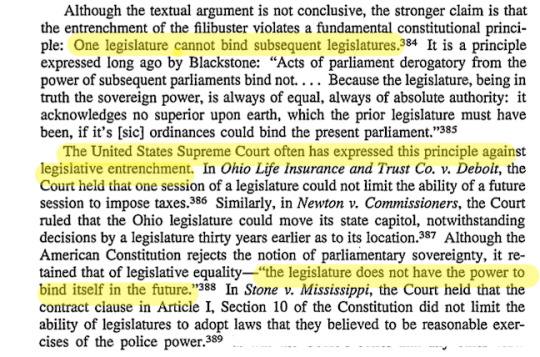
“One legislature cannot bind subsequent legislatures.” Note that Byrd, with his “dead hand” trope, is making the same argument (though not in a Constitutional context). More:
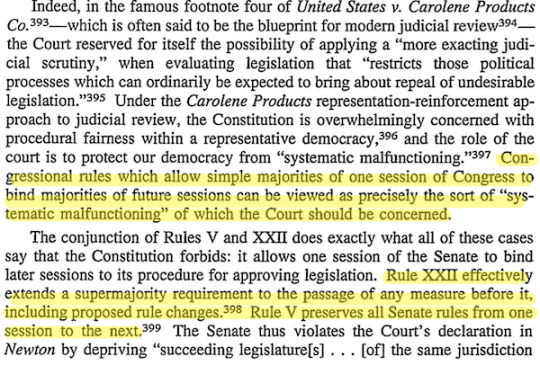
And:
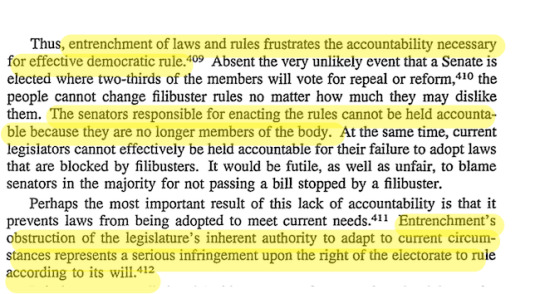
“The senators responsible for enacting the rules cannot be held accountable because they are no longer members of the body.” To make a homely metaphor, George Washington (apocryphally) remarked of the Senate: “We pour legislation into the Senatorial saucer to cool it.” That is the architecture Madison described (and the Heritage Foundation is perhaps overly comfortable within). But in today’s filibuster we have a saucer that was, as it were, willed to us by a previous generation, but with a standing rule that we use a saucer of this size, this depth, this composition, and when we pour today’s hot tea into it, it will crack. Plus it’s not dishwasher-safe. So why not change the standing rule? Here is the key point:
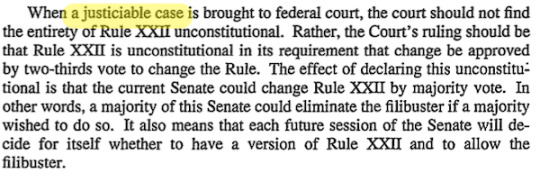
“A justiciable case.” I should say that Fisk and Chemerinsky’s thesis is not uncontroversial (see here and here). However, I’m not seeking a correct legal theory. Rather, I am suggesting that — like Byrd’s threat to invoke the Constitutional option — that the thermonuclear threat of a suit based on the entrenchment thesis would so threaten the Senate’s sense of itself, and its vaunted comity, that filibuster reform (note the moderation of Fisk and Chemerinsky’s terms) might be carried out. Certainly it’s another weapon in the Democrat’s arsenal of “our democracy,” and heaven knows they need one.
Conclusion
The Brookings Institution shows why a Senator might well wish to preserve the filibuster:
Senators often speak about their principled support for the filibuster. But senators’ views about the rules are more often shaped by their views about policy. There would likely need to be a specific measure that majority party senators both agreed upon and cared enough about to make banning the filibuster worth it. As Republicans’ experience in the first two years of the Trump administration suggest, such proposals may be easier imagined than achieved.
In addition, individual senators may find the filibuster useful to their own personal power and policy goals, as it allows them to take measures hostage with the hopes of securing concessions. For majority party leaders, meanwhile, the need to secure 60 votes to end debate helps them to shift blame to the minority party for inaction on issues that are popular with some, but not all, elements of their own party. Finally, senators may be concerned about the future; in an era of frequent shifts in control of the chamber, legislators may worry that a rule change now will put them at a disadvantage in the near future.
In the case of Dobbs v. Jackson Women’s Health Organization, for example, it’s entirely possible that the Democrat leadership is not unhappy with the outcome, and in addition wishes to preserve the filibuster for the time when they will be in the minority once again. These calculations are doubtless more important than procedural arcana, but since arcana define the Senate as a field of battle, it is necessary to understand them.
#roe vs. wade#us senate#us government#biden adminstration#democrats#filibuster#dobbs v. jackson women’s health organization#vote blue
3 notes
·
View notes
Text
Navigating the Labyrinth: Gonzalo Lira's (Coach Red Pill) Legacy and the Concerns of an Independent Thinker
As a fellow American, I want to give my respects to Lira's family and friends. RIP to him as well. We are approaching some strange times in the US and across the world, and while this blog is mainly for self-development I want to bring a moments attention to this. These are my thoughts and reflections after watching this man on Youtube and my own concerns for all Americans. The US Constitution allows for us each day to be able to have the privilege of self development, and I think it is important to recognize what this all means...
In the vast expanse of online discourse, few figures have sparked as much controversy and intrigue as Gonzalo Lira, widely known as Youtube sensation, Coach Red Pill. As an independent thinker who stands outside the bounds of traditional party affiliations, I found myself resonating with some of Lira's insights on heterosexual relationship dynamics and life lessons. However, the complexities surrounding his politics and the alleged failure of the U.S. government to rescue him from Ukraine have given rise to concerns that transcend political lines. This blog post aims to unravel the enigma of Gonzalo Lira, exploring facets beyond my personal agreement or disagreement with his views.
Gonzalo Lira: A Tapestry of Ideas and Controversies
As someone who values diverse perspectives, I appreciate the multifaceted nature of Coach Red Pill's content. Beyond discussions on relationships and life advice, Lira's online presence was marked by politically charged commentary that traversed unconventional terrain. My independent stance allows me to navigate the controversies surrounding him without being tethered to the polarized dynamics of mainstream politics.
Beyond the Online Persona: Gonzalo Lira's Personal and Political Journey
Delving into Lira's background reveals a life shaped by experiences in various countries, contributing to the mosaic of his worldview. While my agreement with some of his insights is tempered by disagreements with certain political perspectives, it is crucial to recognize the complex interplay between the personal and the political in his narrative. The journey of Coach Red Pill extends beyond the confines of online debates, offering a glimpse into the broader canvas of his life.
The Concerns: A Citizen's Perspective
Regardless of party affiliation, the reported failure of the U.S. government to intervene in Lira's situation in Ukraine raises red flags that transcend political divides. As an independent thinker, I am deeply concerned about the potential vulnerability of American citizens abroad and the role our government plays in ensuring their safety. This incident prompts us to question the accountability of those in power, fostering a sense of responsibility that goes beyond party lines.
Navigating the Controversies: A Nuanced Approach
Coach Red Pill's legacy is characterized by both admiration and critique, highlighting the intricacies of his influence. As an independent thinker, I recognize the importance of engaging with nuanced perspectives and acknowledging the gray areas that exist within the realm of online discourse. The controversies surrounding Lira underscore the delicate balance between individual freedom of expression and the societal responsibilities that come with it.
Reflections of an Independent Thinker
In reflecting on Gonzalo Lira's legacy and the concerns raised by his life's narrative, my independent stance allows me to navigate the labyrinth of ideas and controversies without succumbing to the polarizing forces of party politics. The reported failures in ensuring the safety of an American citizen abroad transcend party lines, urging us to collectively demand accountability and transparency from those entrusted with the welfare of citizens. As we contemplate the legacy of Coach Red Pill, let us do so with an independent and critical perspective, recognizing the broader implications for the principles that should bind us together as a society.
#gonzalo lira#Russian war#ukraine#war#American politics#Biden adminstration#Trump adminstration#Republicans#Democrats#Independent party#freedom of speech#thoughts#hot thoughts#self improvement
0 notes
Link
President Biden welcomed Ukraine President Volodymyr Zelenskyy to the White House this week, he continues to seek help from the United States in his determined and globally united effort to stop Putin’s advances into eastern Europe
#Janet Walker#Haute-Lifestyle.com#The-Entertainment-Zone.com#Beltway Insider#Washington DC#Politics#Biden Adminstration#ukraine
1 note
·
View note
Text
If Censorship Could Be Fixed
The United Kingdom could lead the world as clearly with the current junta in charge of the DC leadership will not be found from that former land of Milk and Honey… It was only by the slimmest of margins, that the world averted an economic catastrophe. Now understanding there’s no love lost between Russia and the UK, a war is in no one’s interest, especially Ukraine. Besides, does anyone actually…

View On WordPress
0 notes
Text
every single day the biden adminstration stoops to lower and lower levels of animalistic genocidal fascist depravity
117 notes
·
View notes
Text
As someone who regularly consumes foreign policy commentaries from a South East Asian perspective, the consensus seems to be that Biden's postures towards China is not distinct from that of Trump's in principle, but Biden is much more substantial in his real policies that surgically cripples china's ambitions in several key areas that it had hoped to overcome medium income quagmire.
Biden is much more aggressive in limiting china's access to various technologies and unprecedently, he was able corral more Asian and European holders of related components to do the same.
It's interesting now that both in Europe and in East Asia has reorient their strategic posture towards China to be more inline with united states. During trumps adminstration, there are several factors that could have caused the East Asians and SEA countries to lean the other way, but in general Trump is consider an unreliable strategic partner so they had no choice but to kowtowing to china's foreign policy demands.
In general, biden is just much better at making alliances and much more focused in terms of his foreign policy objective, some say an eerily single mindedness that is slowly tying the noose around china's higher productivity industries, their economic and foreign policy and military ambitions. But you honestly don't hear him talk about it too much, but I hear about it from right wings lot about how he was compromised by China and that's really annoying to me, and it is not correlative of reality.
7 notes
·
View notes
Text
"Blue No Matter Who" has always been an obnoxious cope of a slogan, but I can only hope that the absolute ghoulish inhumanity on display by not only the Biden adminstration but the whole of the Democratic establishment in its broad support of Israel's aggression makes it clear to everyone exactly what that slogan means.
"Blue No Matter Who" does not mean you're willing to accept underwhelming candidates in the name of protecting basic human rights. "Blue No Matter Who" is a badge that shows the DNC that you don't have any actual expectations of your government. "Blue No Matter Who" means you don't actually care what a politician's material positions are so long as they join up with the correct party. It is quite literally a statement of "I will endorse anything so long as my preferred party endorses it", and anyone still campaigning under this banner should be approached with full knowledge that not even seeing their candidates clamor for genocide will sway their vote.
#pepperpost#the current moment is exactly what ''compromise in the name of beating the republicans'' gets us#and i just can't wait to see an army of millions of shmucks next year desperately trying to tell leftists to just forget forget forget#just like last election. just like the election before that. on and on and on
4 notes
·
View notes
Text
CIA und Terroranschlag auf Crocus City Hall

Gibt es Belege für finanzielle Verbindungen zwischen der CIA und dem Terroranschlag auf die Crocus City Hall?
Steckt die CIA hinter der Finanzierung des Terroranschlags?
Nicht einmal eine Stunde nach dem Terroranschlag auf die Crocus City Hall wusste die US-Administration, dass allein ISIS für den Anschlag verantwortlich war, keinesfalls die Ukraine. Auf Ungereimtheiten dieser Behauptung haben unter anderem Experten wie Larry C. Johnson, John Helmer, Andrew Koryko, Thierry Meyssan, und Alastair Crooke hingewiesen.
Die westlichen Medien übernahmen die Behauptung der US-Adminstration ohne selbst zu prüfen.
Alle russischen Bemühungen zur Aufklärung des Anschlags und die danach veröffentlichen Erkenntnisse werden im Westen entweder verschwiegen oder verächtlich kommentiert - siehe beispielsweise:
- "Putins Ablenkungsmanöver" (spiegel.de, 25. 03. 2024)
- "Russia ups blame-shifting for terror attack to Ukraine, brags it’s boosting recruitment" (politico.eu, 08. 04. 2024)
- "Russlands Staats-TV präsentiert neue Erzählung zum Moskauer Anschlag: Medwedew wütet gegen Westen" (fr.de, 10. 04. 2024)
Abgesehen von den ersten Belegen für Verwicklungen der Ukraine in den Terroranschlag tauchen auch immer stärkere Erkenntnisse über die Verbindung zur CIA auf.
Larry C. Johnson schrieb darüber am 09. 04. 2024 einen Blogbeitrag, den ich nachfolgend übersetzt habe.
Beginn der Übersetzung (Links und Hervorhebungen wie im Original):
Gibt es eine Verbindung zwischen der CIA und dem Terroranschlag auf das Crocus City Center?
Das wahre Leben ist besser als der Film. Zweifellos. Die heutige Überraschung kommt aus Moskau, mit einer Ankündigung der staatlichen Organisation, die mit der Untersuchung von Schwerverbrechen beauftragt ist, dass das ukrainische Unternehmen Burisma an der Finanzierung von Terroristen beteiligt war:
Russlands oberste Ermittlungsbehörde gab am Dienstag bekannt, dass sie eine strafrechtliche Untersuchung gegen hochrangige Beamte in den Vereinigten Staaten und NATO-Mitgliedsländern eingeleitet hat, die der "Finanzierung des Terrorismus" verdächtigt werden.
Das russische Ermittlungskomitee, das für die Untersuchung schwerer Verbrechen zuständig ist, erklärte, es habe "festgestellt", dass Gelder von kommerziellen Organisationen in den letzten Jahren zur "Beseitigung prominenter politischer und öffentlicher Persönlichkeiten" innerhalb und außerhalb Russlands sowie zur "Zufügung wirtschaftlicher Schäden" gegen das Land verwendet worden seien. . . .
Die oberste Strafverfolgungsbehörde nannte das ukrainische Energieunternehmen Burisma Holdings als eine der verwickelten Organisationen. Der Sohn von US-Präsident Joe Biden, Hunter Biden, war zwischen 2014 und 2019 Mitglied des Verwaltungsrats von Burisma.
Also, was soll's. Wir wussten bereits von Hunter. Was hat das mit der CIA zu tun? Sagt Ihnen der Name Cofer Black etwas?
Die International Energy Group Burisma hat ihren Vorstand um einen Experten auf dem Gebiet der Sicherheit und der strategischen Entwicklung erweitert. Joseph Cofer Black, ehemaliger Direktor des Anti-Terror-Zentrums der CIA und Sonderbotschafter für Terrorismusbekämpfung, ist vor kurzem als unabhängiger Direktor in den Verwaltungsrat der Burisma-Gruppe eingetreten. Botschafter Black schied 2005 nach einer 30-jährigen Karriere aus dem öffentlichen Dienst aus und gilt als führender Experte und bedeutende Persönlichkeit in Fragen der amerikanischen und internationalen Sicherheit.
Wie wäre das? Ein Berufsoffizier der CIA, der keine Erfahrung in der Öl- und Gasindustrie hat, die über das Tanken für seine eigenen Fahrzeuge hinausgeht, bekommt einen guten Platz in einem Aufsichtsrat neben Hunter Biden. Bevor er in den Vorstand von Burisma kam, ergatterte Mr. Black einen Platz im Vorstand einer lettischen Bank:
Am 11. Oktober 2016 fand eine außerordentliche Versammlung der Aktionäre der Aktiengesellschaft Baltic International Bank ("die Bank") statt, auf der Beschlüsse über Änderungen in der Zusammensetzung des Aufsichtsrats der Bank gefasst wurden.
Joseph Cofer Black wurde eingeladen, sich den bestehenden Mitgliedern des Aufsichtsrats der Bank - Valērijs Belokoņs, Vlada Belokoņa, Andris Ozoliņš und Dr. Hans-Friedrich Von Ploetz - ab dem 1. November 2016 anzuschließen.
Cofer Blacks angebliche Qualifikation für die Mitgliedschaft im Verwaltungsrat der Bank war sein Hintergrund in der Terrorismusbekämpfung. In einem Interview mit dem Wirtschaftsmagazin DELFI behauptete Cofer, er sei Experte für Terrorismusfinanzierung:
Was hat die Terrorismusbekämpfung mit dem Bankwesen gemeinsam? Wie viel Zeit haben Sie? Eigentlich schockierend ähnlich. Ich habe die letzten 12 Jahre meiner Zeit in der Terrorismusbekämpfung verbracht, aber davor habe ich in anderen Bereichen gearbeitet. Ein wichtiger Teil der Terrorismusbekämpfung ist das, was wir heute Finanzterrorismus nennen. Zu Beginn meiner Laufbahn gab es wenig oder gar keine Terrorismusbekämpfung im Finanzbereich. Ich war zwar dafür zuständig, aber ich war nicht sehr erpicht darauf, weil es zeitaufwändig, arbeitsintensiv und teuer ist. In dieser Zeit versucht man, die Terroristen zu überlisten und zu stoppen, bevor sie Menschen töten.
Wie sich herausstellte, war Cofer der lettischen Bank in dieser Angelegenheit keine Hilfe. Im Jahr 2018 wurde die Bank mit einer Geldstrafe belegt:
Die lettische Finanzaufsichtsbehörde, die Finanz- und Kapitalmarktkommission (FKTK), teilte am 6. Dezember mit, dass sie der Baltic International Bank (BIB) "wegen Mängeln im internen Kontrollsystem der Bank" eine Geldstrafe in Höhe von 1,5 Millionen Euro auferlegt...
"Im Jahr 2018 führte die FKTK eine Vor-Ort-Inspektion der Bank sowie eine gezielte Inspektion durch, bei der die FKTK feststellte, dass das interne Kontrollsystem der Bank die regulatorischen Anforderungen zur Verhinderung von Geldwäsche und Terrorismus- und Proliferationsfinanzierung (im Folgenden AML/CTPF) nicht vollständig erfüllt", sagte die FKTK.
"Die Bank hatte kein angemessenes internes Kontrollsystem eingerichtet, um ihren Risiken im Bereich der Verhinderung von Geldwäsche, Terrorismus- und Proliferationsfinanzierung zu begegnen, das eine wirksame Einhaltung der aufsichtsrechtlichen Anforderungen gewährleisten würde", fügte sie hinzu und erläuterte, dass die Bank "in mehreren Fällen" keine ausreichenden Maßnahmen ergriffen hatte, um sich zu vergewissern, dass ein angegebener wirtschaftlicher Eigentümer auch der wirtschaftliche Eigentümer war; keine Unterlagen eingeholt und keine erforderlichen Maßnahmen ergriffen hatte, um sich über die Herkunft der finanziellen Mittel auf ihren Kundenkonten zu vergewissern, und die Schlussfolgerungen nicht dokumentiert hatte; keine angemessene und qualitativ hochwertige verstärkte Sorgfaltspflicht gegenüber Kunden sichergestellt hatte; nicht ordnungsgemäß über die Beendigung von Geschäftsbeziehungen mit Kunden entschieden hatte und, in einer besonders vernichtenden Bemerkung, "untypischen großen, komplexen, miteinander verbundenen Transaktionen ohne offensichtlichen wirtschaftlichen oder eindeutigen rechtlichen Zweck keine ausreichende und besondere Aufmerksamkeit geschenkt hatte. "
Um noch einmal auf die Anschuldigungen des russischen Untersuchungsausschusses zurückzukommen: Wenn Cofer Black im Burisma-Vorstand saß, als Burisma-Gelder an Gruppen mit Verbindungen zu Terroristen überwiesen wurden, dann ist es durchaus verständlich, dass Russland geneigt ist zu glauben, dass die CIA zumindest indirekt in terroristische Anschläge in Russland verwickelt ist. Schade, dass diese lettische Bank nicht mich und meinen Partner anstelle von Cofer eingestellt hat. Wir haben nämlich Programme zur Einhaltung von Vorschriften für Banken und Investmentfirmen geschrieben und umgesetzt, die sie vor solchen Problemen bewahrt haben. Ich kann es kaum erwarten, die Beweise zu sehen.
Heute gab es einige interessante und ungewöhnliche Interviews. Das erste war mit Marcos Soares, einem Brasilianer, der in Italien lebt und arbeitet. Das zweite war mit Sarah von DD Geopolitics. Wir haben über die Verbindungen der CIA zu terroristischen Organisationen gesprochen.
Ende der Übersetzung (Übersetzt mit DeepL.com - kostenlose Version)
Nachtrag vom 11. 04. 2024:
Sie auch: "Mehr über Terrorismusfinanzierung und CIA-Kontakte" (L. Johnson, 10. 04. 2024)
Lesen Sie den ganzen Artikel
0 notes
Text
Regarding the current state of the covid epidemic, and the evolutionary pressures coming to bear on the virus(es?) due to public health decisions on the part of the Biden Administration (et al).
The conclusion:
Taleb defines a “ruin problem” as “one where outcomes of risks have a non-zero probability of resulting in unrecoverable losses.” I suppose it would be possible for some to consider a million people dead from Covid not ruinous — after all, we can always breed more — but taking such risks repeatedly sounds like a very bad idea, especiallly since we’re taking that risk “at the systemic and collective level.”
If the papers I have presented are correct, the Biden Adminstration’s policy of mass infection has brought us to the brink of ruin. Vaccine escape is the direct result of the Administration’s mass infection policy. GM [a comment contributor known to the authors of NC and knowledgeable on health matters] writes:
[N]ever before has such a virus received the opportunity to replicate so fast and so much. We’re talking several orders of magnitude more replication than usual. And these are the results.
In the worst case scenario, the health care system is right back where it was in Spring 2020, with no working vaccines. Moreover, it will be overwhelmed not merely with Covid cases — remember “flattening the curve”? Good times! — but with all sorts of new infections brought about by Covid’s immune dysregulation abilities, as is happening in the UK now.
Even worse, the subvariants with demonstrated immune escape capabilities (BQ/XBB) are peaking and becoming dominant during the Christmas and New Year’s holiday period. Worse than that, the Southwest Airlines debacle has meant that there have been entire families, nationwide, staying 24/7 in airports, which are Covid hotspots, for days. Worse than that, opening up China will — probably already has — expose us to whatever variants have been brewing in immunocompromised Covid patients in that country.
Can’t anyone here play this game? “The pandemic is over.” No, it’s very not. It’s deja vu all over again! How many times do we have to repeat? Maybe try something new? Before it’s really too late?
#covid 19#covid pandemic#biden administration#covid virus#public health#covid subvariants#social murder#sozialer mord#immunocompromised#pandemic#pandemic response
32 notes
·
View notes
Text
OMG! Russia PAWNS Biden adminstration
So starting 3 seconds after the Moscow terror attack, and actually backdated by the Biden administration claiming that they warned everyone, Ukrainian involvement was absolutely positively ruled out.
"Fine," says Russia. "Show us your evidence."
Here. I quote:
She said that if Washington had information, it should be shared and that if Washington had no information, it should not be talking in such a way.
It is looking more and more like the Ukraine was involved.
#Russia#Putin#Moscow#Terror attack#Terrorism#god is a republican#donald trump#conservatives#republicans#gop#trump#election#congress#suck my freedom#kyle rittenhouse
0 notes
Text
Consumer Watch: Biden adminstration to cap credit card late fees - FOX 8
Consumer Watch: Biden ... https://www.google.com/url?rct=j&sa=t&url=https://www.fox8live.com/video/2024/03/07/consumer-watch-biden-adminstration-cap-credit-card-late-fees/&ct=ga&cd=CAIyGjhlZmRiMTE5YjgyN2M3YTM6Y29tOmVuOlVT&usg=AOvVaw1e9Fivlhrm5Hj-St4LlgRv
0 notes
Link
President Biden began his whistlestop fundraising campaign in Las Vegas, Nevada where he announced the $8.2 billion high-speed rail project that will reduce travel between Los Angeles and Las Vegas, two tourist destination cities, to two hours
#Janet Walker#Haute-Lifestyle.com#The-Entertainment-Zone.com#Beltway Insider#biden adminstration#2024 presidential election#norman lear#gop#republicans#Ukraine#israel
1 note
·
View note
Text
The Plot Thickens The Game’s Afoot
Digging in still standing… But keeping head low. My physician wrote that I was obsessive, to wit I had to add dyslexic and no doubt a 21st Century Schizoid Man paranoid neurotic… Two years of Psychological warfare does take its toll. It’s no doubt a good idea to maybe find another physician to sign off on my condition. Well at least to stand up in a court of law. The DoJ brings suit against…

View On WordPress
0 notes
Text
0 notes
Text
Biden adminstration considering plan to force migrants to remains in Texas: report
http://securitytc.com/SvnHWH
0 notes